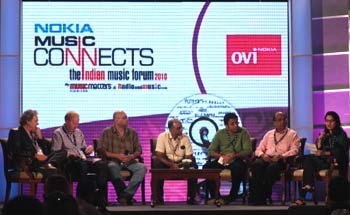MUMBAI: It has been a burning issue for quite sometime. From making noise in the corridors of parliament to hogging the front pages of media the Copyright Act has been a topic of contention and the one person who can be singled out as having brought it out into the limelight and without mincing any words is veteran lyricist Javed Akhtar.
Staying true to his image, Javed Akhtar spoke at length about the copyright issue at the second day of Nokia Music Connects, giving various analogies to demonstrate that composers and lyricists are right in asking for the amendments. The fact that the producers and labels ask the composers and lyricists to surrender all their rights is a proof enough that there is something to assign to them,… said Akhtar further adding that the rights belong to the author and that they should be now turned into non-assignable rights Abroad musicians also get royalty for background score something which is unheard of in India. The music companies makes money from digital sales, ringback tones, music used on television. We want a share of the pie for the revenues earned from music used outside the film,… added the veteran lyricist.
Akhtar also said that he was very happy with the way government has supported the copyright bill and was very hopeful that the bill which at present is with the standing committee of the parliament will be passed with the required amendments.
Following Akhtar’s enthusiastic speech, there was a panel discussion which included speakers like Archille Forler from Deep Emotions Universal Music Publishing, Apurv Nagpal from Saregama, Liam Donnelly from PRS for Music, music composer Raju Singh, Rakesh Nigam from IPRS and Nishith Desai & Associates media specialist Gauri Gokhale, moderated by Atul Churamani. It discussed the current scenario, problems and also giving an insight as to what can probably be the path ahead.
As expected there were fireworks as the panel discussed the much publicized topic with an equal enthusiastic audience. Gokhale started off the panel reading out the main amendments in the copyright act that that pertained to music. One of the points she pointed out was that music composers and lyricists will now be granted special rights where in even if they give their work for exploitation they will retain the right to claim royalty. The proposed bill also allows ownership to be transferred to the heir of the deceased music composer/lyricist. It also offers few moral rights to them.
Gokhale also pointed out the flip side of the amendment as it does not define royalty giving scope for ambiguity. Also there is little clarity on how this royalty will be determined.She also mentioned that the act is still ambiguous and should be defined more distinctly.
Spearheading the conversation Raju Singh said that though he is happy with the new proposed amendment, he addressed the same issue of ambiguity. I have received royalties for my music in films being played abroad but not in India. This shows the sad state of affairs. The sooner the laws come into practice the better it will be for the industry….
Rakesh Nigam further added that even reality shows on television do not want to give money for the songs that are played. “They pay money if the content is played outside…
The panel gave an insight about the laws prevailing abroad saying that the percentage of music played is much higher here than in films abroad. Hence the problem of copyright arises more in the country. Talking from international perspective Liam Donnelly added, If the rights in India become non-assignable it will become different from international models followed elsewhere.”
Achille Forler gave another dimension to the discussion where he said that there is a dire need of a full fledged publishing industry being nurtured. The problem in India is that creators’ and producers’ rights have bundled up unlike overseas where such issues do not arise because of clear defined roles and territories of both the parties. Someone needs to take step to unbundle these rights only then will there be a model that is viable for all….
Representing the interests of the music labels, Apruv Nagpal gave a different view. The copyright in its form is unacceptable to us as a label. There will be a flood of litigation with the way the copyright law is structured. There needs to be a lot more clarity and it needs to be worded better. We need to distinguish between film and non-film music. Film music dominates in the country unlike internationally. We cannot apply foreign laws in India blindly. All the stakeholders should sit and talk it out rather than taking the route of the law. Some models may work for few while there should be an option of alternate models for others….
The panel also saw a heated discussion between Akhtar and Nagpal both of them ready to pounce each on each other. A lot of opposition and hue and cry was raised over the issue and even though the panel reached no concrete solution, it ended on a positive note that all the stakeholders need to work out their issues amicably to provide for an environment where the industry can flourish.
